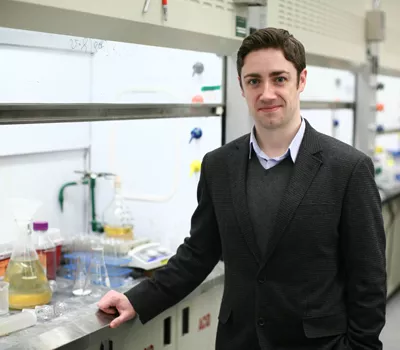
Medicinal chemist targets cancer; receives prestigious award
The Royal Society of Chemistry. It’s the oldest and most prestigious chemistry society in the world and for Patrick Gunning, it makes being named the inaugural winner of their MedChemComm Emerging Investigator Lectureship Award even more meaningful.
“I am absolutely delighted and honoured to be the recipient of this award. It’s a wonderful surprise,” says Gunning, an associate professor in the Department of Chemical & Physical Sciences at the University of Toronto Mississauga. “I’m overwhelmed that our group was singled out by the RSC for this medicinal chemistry award.”
The work that drew the RSC’s attention is Gunning’s development of new approaches to targeting cancer; in particular, his research on inhibiting the activity of two cancer-promoting proteins, Stat3 and Stat5. “We’ve made molecules that are actually drug-like, with really promising results against cancer in our early in vivo models,” Gunning says.
With his team of 22 undergraduates, graduate students and post-doctoral fellows, Gunning has put out an imposing body of work over the last five years, with almost 50 published papers. The work his lab is doing is so innovative that he already has six registered patents, with more to come.
Although Gunning himself typically works fourteen hours a day, he attributes his lab’s productivity to the hard work of the people he hires. His criteria are simple: smart, energetic people who are excited by research and willing to go the extra mile.
While Gunning believes the best scientists have a combination of imagination and strong work ethic, it’s the commitment to hard work that he tries foster in his students. “Chemistry is a very practical science. In general, you need to be physically in lab, putting on reactions, working them up and testing the results,” he says. “Unfortunately, in medicinal chemistry it's very difficult to simply publish a theory. You have to put in the lab hours to synthesize the drugs to back your hypothesis.”
He admits that he doesn’t have to do much motivation to keep heads to fume hoods, though. “The people in my lab are very self-motivated.” It helps that his industry-based model is also one that encourages independence and autonomy, as well as providing mentorship opportunities between the students themselves.
Currently, the group has several different projects underway, and each student plays a specific role or has a direct line of research within that project. Each of these groups publishes their own work with Gunning.
And, he points out, “they all happen to be extremely nice people.” Known as the Gunning Group, the lab is so large and congenial that they have their own baseball and soccer teams. Two social conveners help organize events over the year, including kayaking (one of Gunning’s own favourite pastimes).
For Gunning, the students are a welcome escape from the details of administrative work. “With my students I get to talk science, become immersed in exciting research and share their enthusiasm,” he says.
Knowing the impact their work will have on cancer patients could be what’s driving their intensity and making the long hours in the lab worthwhile. After all, it’s what initially hooked Gunning during his post-doc at Yale University. “I loved the idea of making molecules that could kill cancer cells. Seeing the product of my labours killing breast cancer cells was highly rewarding,” he says. “It was transformational.”
As well as the recognition from the MedChemComm Emerging Investigator Lectureship, Gunning has recently received almost a million dollars from the Canadian Cancer Society ($200,000), the Canadian Breast Cancer Foundation ($450,000) and the National Institutes for Health ($250,000). The funding will be used for the development of new therapeutics for targeting breast cancer and leukemia.
Gunning’s ultimate goal, and one that he believes is achievable within his career, is to have a protein inhibitor in the clinic for treatment of brain cancer and leukemia. “We’re at the advanced pre-clinical trial stage with several inhibitors now. Our goal is to get a drug into phase one clinical trials.”
“U of T is great for encouraging and supporting world-class research,” says Gunning. “UTM really supports my research career and provides me with the facilities and space I need to do the research I do.”
